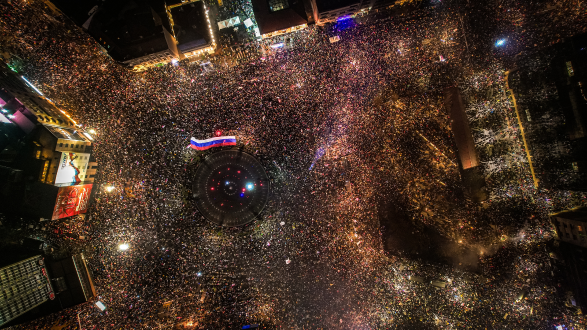Zoom Webinar
Join the Pacific Council on June 12th at 10 am PT for a conversation examining the state of political relations and democracy in the Balkans. As political tensions rise across the region, civil society remains a vital force in safeguarding democracy. This event will explore the complex geopolitical dynamics shaping the Western Balkans through three key segments.
- The Western Balkans and Trump 2.0
- Rise of Authoritarianism and Geopolitical Rivalries
- The Power of Civil Society and Popular Movements for Democracy
The Western Balkans and Trump 2.0
Donald Trump's second term poses a challenge to the established security framework of the Western Balkans, which the U.S. has helped build over decades through diplomatic, political, and military efforts. These include efforts still upheld by the U.S., such as the Dayton Peace Accords in Bosnia, as well as Kosovo’s pursuit of independence, which contributes to regional stability. The potential erosion of the regional security architecture increases the risk that regional cracks—particularly in Kosovo, Bosnia, and Serbia—will undermine peace and stability, and be exploited by both external powers and internal factions.
Leaders such as Serbia’s Vučić and Bosnia’s Dodik have sought personal and economic benefits from previous U.S. engagement. Trump’s administration cultivated relationships with these figures, supporting their political and economic ambitions, primarily real estate investments that have deepened ties with Serbia and Albania. Trump’s tariffs, while primarily impacting trade with the EU, could indirectly affect the Balkans by slowing GDP growth—models suggest a mild slowdown in growth. Local governments are not powerless; they have the tools and the responsibility to act to prevent a more serious fallout. Their actions, alliances, and policies in the coming months will be critical.
Rise of Authoritarianism and Geopolitical Rivalries
A resurgence of authoritarianism, coupled with militarization, threatens the global order, pushing it toward a tipping point. Around the world, enemies of liberal democracy are accelerating their assaults, undermining norms, eroding institutions, and supporting each other strategically. Over a third of the global population now lives in “Not Free” countries - the highest since 1997.
The implications are profound for the Western Balkans: geopolitics is increasingly influenced by external powers, with Russia, China, and regional autocrats leveraging the chaos to consolidate power. The recent past showcases an increase in unilateral Western Balkan policies, exemplified by Trump's engagement with Serbia and Kosovo, which, while providing some progress, risk fueling regional tensions and undermining NATO’s credibility. U.S. leadership could reinforce illiberal leaders, deepen regional insecurity, and challenge EU accession prospects.
The Power of Civil Society and Popular Movements for Democracy
Across the region, civic activism remains vibrant and resilient. Mass protests have erupted in Tbilisi, Budapest, Bucharest, and Belgrade, with tens of thousands of citizens demanding democratic reforms and accountability. In Serbia, shoddy infrastructure, corruption, and authoritarian entrenchment have sparked months of mass protests, most notably in Belgrade, where over 300,000 people took to the streets in March. These demonstrations are driven by youth, civil society, and a shared desire for democratic change despite government repression and attempts to curb dissent.
The protests in Georgia and Serbia reveal commonalities: embattled governments with authoritarian tendencies are overstaying their welcome, and the protesters remain committed to reform, often at great personal risk. These civic movements are vital to the region’s future, showcasing the enduring power of civil society to challenge authoritarian power, safeguard democratic values, and inspire broader societal transformation.
Speaker
Melissa Hooper, an impact-focused lawyer and rule of law expert has led legal advocacy and foreign policy research programs both domestically and internationally for over 20 years. She currently serves as a Senior Fellow at the German Marshall Fund focused on rule of law and democracy. Until recently she was a Senior Advisor at the U.S. Agency for International Development (USAID), where she provided strategic guidance on democracy, governance, and rule of law issues, working closely with agency leadership, U.S. Ambassadors and international partners. She has played a key role in advocating for judicial independence and human rights across Europe and Eurasia, while also advising on U.S. policy responses to democratic backsliding. Melissa has been a frequent speaker at high-level international forums, has authored numerous publications on democracy and corruption, and has testified before Congress on key issues related to protection of civil society, rule of law, U.S. policy, and national security. Additionally, she teaches Human Rights Law at Arizona State University and has a distinguished career advocating for human rights, accountability, and anti-corruption measures globally.
Speaker
Frauke Seebass is a PhD Candidate and Carl Lutz Fellow at Andrássy University Budapest where she focuses on EU foreign policy towards Kosovo. Currently, she is a Visiting Fellow at the German Institute for Foreign & Security Affairs (SWP) in Brussels and an Associate Fellow with the German Council on Foreign Relations (DGAP) in Berlin, working on EU enlargement towards the Western Balkans and beyond.
Presider
Milena Berić ( b. 1982 in Belgrade, Serbia, then SFR Yugoslavia) holds an MA in Communicology and a BSc in North America Economic studies and EU Economic studies. Milena is a researcher and political analyst with extensive experience in international political briefings, focusing on Western Balkans politics, as well as Russian FIMI campaigns. Milena began her dynamic career in 2001, working for the OECD, at the Athens Olympic Games 2004, for Greek national television (ERT), and for the Indian embassy in Belgrade. In the following years, she served as an Account Director at DDB and TBWA Worldwide advertising agencies, as well as an analyst at Adidas headquarters in Germany. Since 2010, Milena has focused on the civil society sector, developing her skills in organizational development, strategic communications, and external relations, while leveraging her specific interests and experience in storytelling and campaign strategies. In 2007, she presented her research paper, “Culture, Dignity and Empowerment,” at the 6th Pan-European International Relations Conference in Turin. She was named one of the “30 Under 30 Young Serbian Leaders” in 2011, the same year she represented Serbia at the European Forum Alpbach. Since 2014, Milena has been fully committed to the KROKODIL Association, which has grown over the past ten years to become one of the most significant think tanks and do tanks in Southeast Europe, winning more than five credible international awards. Milena is a co-author of several important publications, including “Liberté, Égalité, Solidarité: Research with Proposals and Recommendations for the Involvement and Cooperation of Civil Society Organizations in Response to the Aggression against Ukraine,” “Survey and Analysis on the Undue Influence on the Rise of Violence in Serbia,” and “Impact of the COVID-19 Pandemic on the Independent Sector in the Balkans.” During the past 7 years, Milena executed a series of lectures, workshops, trainings, analyses, and reports for different international projects and organisations. Milena is a member of the Pacific Council on International Policy.
She translates from Greek and is fluent in English, French, and Greek, as well as conversant in German, Spanish, and Italian.







